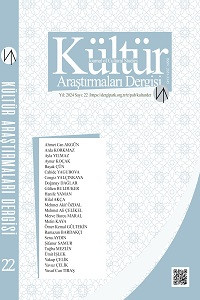Child Labor Arif, the Protagonist of Talip Apaydın's Sarı Traktör, and Arif's Educational Opportunities
Abstract
When we look at the main axis of the articles in terms of the Republican era, Mahmut Makal's text Bizim Köy is seen as a threshold in defining "Village Literature” within Turkish literature. Alongside certain orientations such as the Marshall Plan within the political orbit of the Republic of Turkey in the late 1940s and early 1950s, changes in agricultural methods, the proliferation of mechanization in agriculture, and the change in power have led Turkish writers/intellectuals to focus on the village, the perception of the villager, and the changes in the villager's situation. The journey that began with Mahmut Makal continued with many writers/intellectuals such as Samim Kocagöz, Talip Apaydın, Abbas Sayar, Fakir Baykurt, Yaşar Kemal, Orhan Kemal, and Kemal Tahir. In this regard, when we look at the novel Sarı Traktör [Yellow Tractor], which forms the main axis of the articles, it can be seen that the studies conducted within the scope of the novel focus on mechanization in agriculture, the perception of the village and the villager, and the ideological position of the teacher figure in the village, in terms of structure and plot dimensions. The original aspect of the article will emerge here; the article will focus on Arif, the protagonist of the novel, and his child labor and lack of educational opportunities. In addition to the studies shaped specifically around Arif's desire for a tractor and his efforts for this desire, this article will bring to the agenda issues such as whether village teachers address Arif's educational problems, whether there are expectations regarding education in general within the village community concerning Arif, what responsibilities are imposed on Arif as a child, and Arif's attitude towards these responsibilities.
Keywords
Thanks
I would like to express my gratitude to all the faculty members of the Turkish Language and Literature Department at Hacettepe University, especially my academic advisor Assoc. Prof. Dr. Koray Üstün, who helped me.
References
- Apaydın, Talip (2007). Sarı Traktör. İstanbul: Literatür Yayıncılık.
- Berktay, Fatmagül (2015). Tarihin Cinsiyeti. İstanbul: Metis Yayınları.
- Beşoluk, Erdal ve Parlak, Zeki (2022). “Temel Bir Çalışma Standardı Olarak Gelişmekte Olan Ülkelerde Çocuk İşçiliği”. Ekonomi Maliye İşletme Dergisi, 5(1): 54-67.
- Butler, Judith (2014). Bela Bedenler. İstanbul: Pinhan Yayıncılık.
- Butler, Judith (2019). Cinsiyet Belası. İstanbul: Metis Yayınları.
- Büyüksungur, İncinur (2022). Çocuk İşçi Kavramı ve Çocuk İşçilerin Hakları. Yüksek Lisans Tezi. İzmir: Dokuz Eylül Üniversitesi.
- Çöpoğlu, Mustafa (1998). Çocuk İşçiliği. Doktora Tezi. İstanbul: İstanbul Üniversitesi.
- Çöpoğlu, Mustafa. (2018). “Türkiye’de Çocuk İşçiliği”. Iğdır Üniversitesi Sosyal Bilimler Dergisi, 14: 357-398.
- Enginün, İnci (2017). Cumhuriyet Dönemi Türk Edebiyatı. İstanbul: Dergâh Yayınları.
- Gül, Tolga (2022). Çocuk İşçiliği ve Psikolojik Yansımaları. Ankara: Gazi Kitabevi.
- Gündüz, Osman (2015). “Cumhuriyet Dönemi Türk Romanı”. Yeni Türk Edebiyatı El Kitabı. Ed. Ramazan Korkmaz. Ankara: Grafiker, 377-509.
- Tören, Tolga (2006). Yeniden Yapılanan Dünya Ekonomisinde Marshall Planı: Türkiye Örneği. Yüksek Lisans Tezi. İstanbul: Marmara Üniversitesi.
- URL-1: https://ataturkansiklopedisi.gov.tr/bilgi/marshall-plani/ (Erişim: 10.03.2024).
- Woolf, Virginia (2022). Kendine Ait Bir Oda. İstanbul: İletişim Yayınları.
Abstract
Makalenin ana eksenini oluşturan Cumhuriyet devrine bakıldığında Mahmut Makal’ın Bizim Köy adlı metni, Türk edebiyatı içerisinde “Köy Edebiyatı” tanımlaması noktasında bir eşik olarak görülmektedir. 1940’ların sonları ile 1950’lerin başlarında Türkiye Cumhuriyeti’nin siyasi yörüngesinde bulunan Marshall Planı gibi kimi yönelimlerle birlikte tarımdaki yöntemlerin değişmesi, tarımda makineleşmenin yaygınlaşması, iktidarın değişimi ile birlikte köy, köylüye bakış, köylünün içinde bulunduğu durumun değişimi, Türk yazar/aydınının dikkatini bu yöne çevirmesine sebep olmuş; Mahmut Makal ile başlayan serüven Samim Kocagöz, Talip Apaydın, Abbas Sayar, Fakir Baykurt, Yaşar Kemal, Orhan Kemal, Kemal Tahir gibi birçok yazar/aydın ile devam etmiştir. Bu noktada, roman özelinde yapılan çalışmaların tarımda makineleşme, köy ve köylüye bakış, köydeki öğretmen imgesinin ideolojik konumu, yapı ve izlek boyutlarında olduğu görülür. Bu çalışma, diğerlerinden farklı olarak romanın başkahramanı olan Arif’in çocuk işçiliğine ve eğitim olanaklarından uzaklığına odaklanacaktır. Bu zamana kadar Arif’in traktör arzusu ve bu arzu için verdiği uğraş özelinde şekillenen çalışmaların yanı sıra bu makale, köy öğretmenlerinin Arif’in nezdinde eğitim sorunlarını dile getirip getirmediklerini, köyün geneli tarafından Arif özelinde eğitim-öğretime dair beklentilerin olup olmadığını, bir çocuk olan Arif’e hangi sorumlulukların yüklendiği ve Arif’in bu sorumluluklar karşısındaki tavrı gibi meseleleri gündeme getirecektir.
Keywords
Thanks
Bugünlere gelmeme vesile olan başta akademik danışmanım Doç. Dr. Koray Üstün olmak üzere Hacettepe Üniversitesi Türk Dili ve Edebiyatı Bölümünün her bir öğretim üyesine teşekkürü bir borç bilirim.
References
- Apaydın, Talip (2007). Sarı Traktör. İstanbul: Literatür Yayıncılık.
- Berktay, Fatmagül (2015). Tarihin Cinsiyeti. İstanbul: Metis Yayınları.
- Beşoluk, Erdal ve Parlak, Zeki (2022). “Temel Bir Çalışma Standardı Olarak Gelişmekte Olan Ülkelerde Çocuk İşçiliği”. Ekonomi Maliye İşletme Dergisi, 5(1): 54-67.
- Butler, Judith (2014). Bela Bedenler. İstanbul: Pinhan Yayıncılık.
- Butler, Judith (2019). Cinsiyet Belası. İstanbul: Metis Yayınları.
- Büyüksungur, İncinur (2022). Çocuk İşçi Kavramı ve Çocuk İşçilerin Hakları. Yüksek Lisans Tezi. İzmir: Dokuz Eylül Üniversitesi.
- Çöpoğlu, Mustafa (1998). Çocuk İşçiliği. Doktora Tezi. İstanbul: İstanbul Üniversitesi.
- Çöpoğlu, Mustafa. (2018). “Türkiye’de Çocuk İşçiliği”. Iğdır Üniversitesi Sosyal Bilimler Dergisi, 14: 357-398.
- Enginün, İnci (2017). Cumhuriyet Dönemi Türk Edebiyatı. İstanbul: Dergâh Yayınları.
- Gül, Tolga (2022). Çocuk İşçiliği ve Psikolojik Yansımaları. Ankara: Gazi Kitabevi.
- Gündüz, Osman (2015). “Cumhuriyet Dönemi Türk Romanı”. Yeni Türk Edebiyatı El Kitabı. Ed. Ramazan Korkmaz. Ankara: Grafiker, 377-509.
- Tören, Tolga (2006). Yeniden Yapılanan Dünya Ekonomisinde Marshall Planı: Türkiye Örneği. Yüksek Lisans Tezi. İstanbul: Marmara Üniversitesi.
- URL-1: https://ataturkansiklopedisi.gov.tr/bilgi/marshall-plani/ (Erişim: 10.03.2024).
- Woolf, Virginia (2022). Kendine Ait Bir Oda. İstanbul: İletişim Yayınları.
Details
| Primary Language | Turkish |
|---|---|
| Subjects | Modern Turkish Literature in Turkiye Field |
| Journal Section | Research Articles |
| Authors | |
| Publication Date | September 10, 2024 |
| Submission Date | May 21, 2024 |
| Acceptance Date | July 2, 2024 |
| Published in Issue | Year 2024 Issue: 22 |


